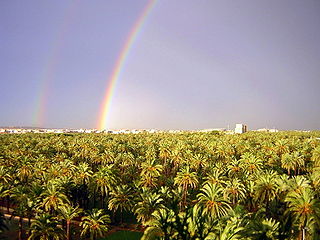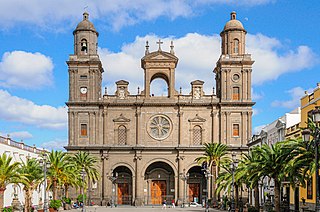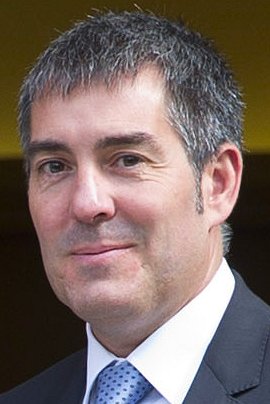Related Research Articles

The Canary Islands, also known informally as the Canaries, are a Spanish autonomous community and archipelago in Macaronesia in the Atlantic Ocean. At their closest point to the African mainland, they are 100 kilometres west of Morocco. They are the southernmost of the autonomous communities of Spain. The islands have a population of 2.2 million people and are the most populous special territory of the European Union.

Phoenix dactylifera, commonly known as the date palm, is a flowering-plant species in the palm family, Arecaceae, cultivated for its edible sweet fruit called dates. The species is widely cultivated across northern Africa, the Middle East, and South Asia, and is naturalized in many tropical and subtropical regions worldwide. P. dactylifera is the type species of genus Phoenix, which contains 12–19 species of wild date palms.

The Guanches were the indigenous inhabitants of the Canary Islands in the Atlantic Ocean some 100 kilometres (60 mi) west of the North African coast. They spoke the Guanche language, which went extinct in the 17th century and is believed to have been related to Berber languages.

Beauveria bassiana is a fungus that grows naturally in soils throughout the world and acts as a parasite on various arthropod species, causing white muscardine disease; it thus belongs to the group of entomopathogenic fungi. It is used as a biological insecticide to control a number of pests, including termites, thrips, whiteflies, aphids and various beetles. Its use in the control of bedbugs and malaria-transmitting mosquitos is under investigation.

Phoenix canariensis, the Canary Island date palm or pineapple palm, is a species of flowering plant in the palm family Arecaceae, native to the Canary Islands off the coast of Morocco. It is a relative of Phoenix dactylifera, the true date palm. It is the natural symbol of the Canary Islands, together with the canary Serinus canaria. Mature P. canariensis are often used in ornamental landscaping and are collected and transplanted to their new planting location. A Canary Island date palm with 10 m (30 ft) of trunk is about 60 years of age.

The Palmeral or Palm Grove of Elche is the generic name for a system of date palm orchards in the city of Elche, Spain.
Parmacella tenerifensis is a species of air-breathing land slug, a shell-less terrestrial gastropod mollusk in the family Parmacellidae.

The 2011 Canarian regional election was held on Sunday, 22 May 2011, to elect the 8th Parliament of the Autonomous Community of the Canary Islands. All 60 seats in the Parliament were up for election. The election was held simultaneously with regional elections in twelve other autonomous communities and local elections all throughout Spain.

The South American palm weevil, Rhynchophorus palmarum, is a species of snout beetle. The adults are relatively large black beetles of approximately one and a half inch in length, and the larvae may grow to two inches in length.

The Cathedral of Santa Ana is a Roman Catholic church located in Las Palmas, Canary Islands. The cathedral is the see of the Roman Catholic Diocese of Canarias. It is situated within the Vegueta neighborhood, next to the Plaza Mayor of Santa Ana.

The 2016 Copa del Rey de Baloncesto was the 80th edition of the Spanish King's Basketball Cup. It was managed by the ACB and was held in A Coruña, in the Coliseum on February 18–21, 2016. Real Madrid won their 26th cup.

The 2015 Canarian regional election was held on Sunday, 24 May 2015, to elect the 9th Parliament of the Autonomous Community of the Canary Islands. All 60 seats in the Parliament were up for election. The election was held simultaneously with regional elections in twelve other autonomous communities and local elections all throughout Spain.

The 2007 Canarian regional election was held on Sunday, 27 May 2007, to elect the 7th Parliament of the Autonomous Community of the Canary Islands. All 60 seats in the Parliament were up for election. The election was held simultaneously with regional elections in twelve other autonomous communities and local elections all throughout Spain.

The 2019 Canarian regional election was held on Sunday, 26 May 2019, to elect the 10th Parliament of the Autonomous Community of the Canary Islands. All 70 seats in the Parliament were up for election. The election was held simultaneously with regional elections in eleven other autonomous communities and local elections all throughout Spain, as well as the 2019 European Parliament election.

The 2023 Canarian regional election was held on Sunday, 28 May 2023, to elect the 11th Parliament of the Autonomous Community of the Canary Islands. All 70 seats in the Parliament were up for election. The election was held simultaneously with regional elections in eleven other autonomous communities and local elections all throughout Spain.
In the run up to the 2015 Spanish local elections, various organisations carried out opinion polling to gauge voting intention in local entities in Spain. Results of such polls for municipalities and island cabildos in the Canary Islands are displayed in this article. The date range for these opinion polls is from the previous local elections, held on 22 May 2011, to the day the next elections were held, on 24 May 2015.

The Palm Trees Park, also known simply as Las Palmeras, is a public park in the heart of Pontevedra in Spain. It is the most representative and emblematic green area in the city centre, together with the Alameda de Pontevedra.
In the run up to the 2023 Spanish local elections, various organisations carry out opinion polling to gauge voting intention in local entities in Spain. Results of such polls for municipalities and island cabildos in the Canary Islands are displayed in this article. The date range for these opinion polls is from the previous local elections, held on 26 May 2019, to the day the next elections will be held, on 28 May 2023.
References
- ↑ de Gruyter, J.; Woudenberg, J.H.C.; Aveskamp, M.M.; Verkley, G.J.M.; Groenewald, J.Z.; Crous, P.W. (June 2013). "Redisposition of phoma-like anamorphs in Pleosporales". Studies in Mycology. 75: 1–36. doi:10.3114/sim0004. PMC 3713885 .
- ↑ "Web informativa del picudo rojo en Canarias". Gobierno de Canarias Consejeriá de Agricultura, Ganadería, Pesca y Aguas.
- ↑ "Picudo rojo (Rhynchophorus ferrugineus)". Ecologistas en Acción (in Spanish). May 2005. Archived from the original on 2015-09-23.
- ↑ Muhammad Riaz; Vivek Kumar; Eiman Mansoury; Fatma Al-Kandari; Eman Al-Kandari; Eman Al-Attar; Fatma Al-Ame (2009). "Pink rot of inflorscence[sic]: a new disease of date palm in Kuwait" (PDF). Mycopath. 7 (1): 1–4.